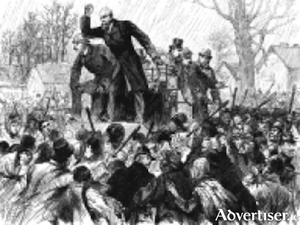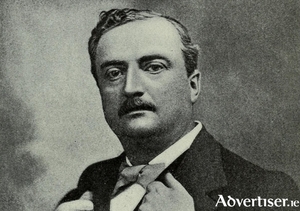Search Results for 'Charles Stewart Parnell'
17 results found.
‘A pale granite dream, afloat on its own reflection’

Mitchell Henry’s final days in Kylemore were sad ones. His adored wife Margaret had died at 45 years-of-age, and rested in a simple brick mausoleum in the grounds of his palatial Kylemore Castle. His political life, into which he put a great deal of personal effort, advocating on behalf of all Irish tenants the rights for them to own their own land, was out manoeuvred by Charles Stewart Parnell and the Land League. Henry described the Land League methods as ‘dishonest, demoralising and unChristian’. He probably was not surprised to lose his Galway seat in the general election of 1885. He blamed ‘Parnellite intimidation’.
‘It is not our mistress we have lost, but our mother.’

When Mitchell Henry entered Westminster parliament in 1871 he went with hope in his heart and a mission to tell the British people the circumstances of the Irish tenant farmer. He reminds me of the Frank Cappa film Mr Smith Goes to Washington where a naive, idealistic young man has plans to change America.* Mitchell Henry, a liberal, kindly man, had however, walked into a political cauldron, waiting to explode.
What happened to home rulers after independence?

UNTIL SINN Féin swept the boards at the 1918 general election, winning 73 seats - the overwhelming majority - the Irish Parliamentary Party had been the dominant force in Irish politics.
The awaking of Augusta …A creative life
Augusta Lady Gregory, and her husband Sir William, were away in Italy in May 1888, when her former lover Wilfrid Scawen Blunt was imprisoned in Galway for participating in an anti-eviction rally at Woodford the previous October. I described last week, that within two days of her return to Galway she visited his empty cell, and remained sometime.*
When cricket was 'alive ho in the west'
The 1880s was a watershed in the history of sport in Ireland. Soccer's All-Ireland governing body was established in Belfast in 1880 and during that decade the sport began to spread out from Ulster and scatter throughout the island. The first set of rules for rugby were drawn up in England in 1845, but the sport did not gain much traction in Ireland until the 1880s, a mere 10 years after the first game was played on Irish soil. The sport’s managing body, the Irish Rugby Football Union, was founded in 1879. The Golfing Union of Ireland was established in 1891, and though the game was being played in Ireland prior to that date, it had not attracted a Mayo following. The first golf club in Connacht was only founded in 1892. In 1884, the Gaelic Athletic Association was formed with a view to promoting Ireland’s native games. All of these sports have grown to become extremely popular in Mayo today but one sport, once arguably the most popular organised sport in the county, has virtually disappeared.
1879 - a forgotten year of famine and fury
It may not be scorched on the Irish psyche as the Great Famine of 1845-52 is, but the famine of 1879, which affected the west more than any other region, brought suffering and led to an increase in agrarian offences committed by furious and despairing tenants. In 1879 the Great Famine was still a painful memory for a large number of people. Most had witnessed first-hand family and friends die a slow, torturous, death by starvation, and had parted indefinitely with family members who had emigrated in an attempt to escape the living hell of famine. The population of Mayo fell by almost 30 per cent during the Great Famine due to death and emigration, and by 1879 the county was still recovering.
Nineteenth century Galway elections
Elections in the 19th century were a great deal more lively, entertaining, and violent than those of the present day.

